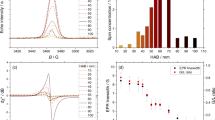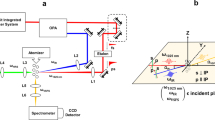Abstract
DURING a search for stable free radicals in airborne dust by means of electron spin resonance, strong broad signals were consistently observed. The absorption lines (Fig. 1) had an approximately Lorentzian form with a width of about 400 gauss (measured between the peaks of the derivative curves) and remained fairly constant with time. The mean observed g-value of forty samples was 2.097±0.017 (S.D.). The most likely origin of these signals seemed to be iron, naturally occurring in airborne dust, and the relationship between the intensity of the resonance signal and the iron content was investigated further.
This is a preview of subscription content, access via your institution
Access options
Subscribe to this journal
Receive 51 print issues and online access
$199.00 per year
only $3.90 per issue
Buy this article
- Purchase on Springer Link
- Instant access to full article PDF
Prices may be subject to local taxes which are calculated during checkout
Similar content being viewed by others
References
Mackenzie, R. C., and Meldau, R., Staub, 27, 226 (1967).
Smith, R. W., and Fuller, M., Science, 156, 1131 (1967).
Schrader, R., and Büttner, G., Z. Anorg. Allgem. Chem., 320, 220 (1963).
Author information
Authors and Affiliations
Rights and permissions
About this article
Cite this article
STRACKEE, L. Electron Spin Resonance of Ferromagnetic Particles in Airborne Dust. Nature 218, 497–498 (1968). https://doi.org/10.1038/218497a0
Received:
Published:
Issue Date:
DOI: https://doi.org/10.1038/218497a0
Comments
By submitting a comment you agree to abide by our Terms and Community Guidelines. If you find something abusive or that does not comply with our terms or guidelines please flag it as inappropriate.



